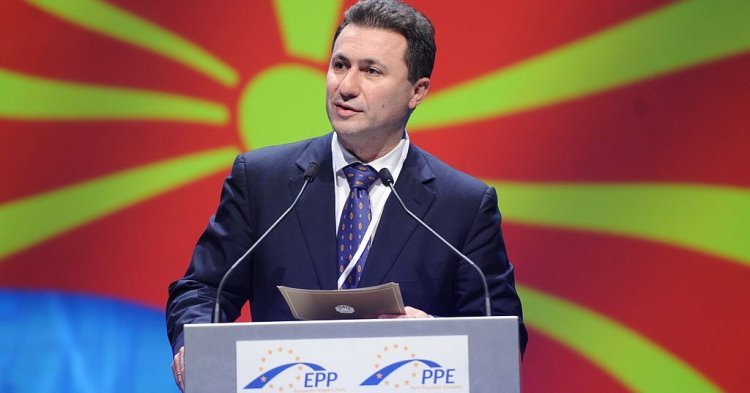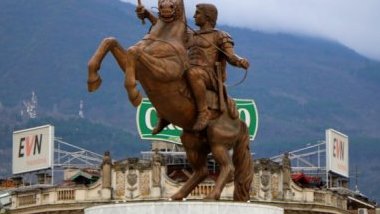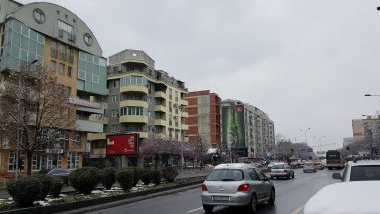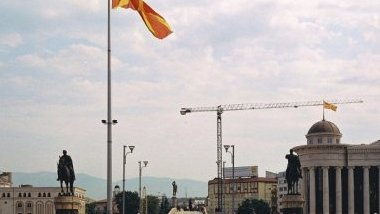The legislative elections of 12th december 2016 brought the right-wing VMRO-DPMNE (ВМРО-ДПМНЕ) party to power, or to use its full name: the Internal Macedonian Revolutionary Organisation – Democratic Party for Macedonian National Unity (Внатрешна македонска револуционерна организација - Демократска партија за македонско национално единство или скратено). For two days several other parties claimed victory, before the European Commission stepped in to confirm the nationalist party had won with a narrow 2% margin, or 17,000 votes. A disappointing result for a party that has, for the last two years, not hesistated to lead an aggressive campaign around the superiority of ethnic Macedonians over its minorities, which compose 30% of the population.
Nikola Gruevski, previous president of the republic from 2006 to 2016 and leader of the VMRO-DPME Party, succeeded in creating a positive image for himself by offering subsidies to foreigners: ineffective measures in the long-term but has injected a much needed short term recovery, reducing unemployment from 36% to 24% in ten years. Either way, his party secured 51 members of parliament, against the 49 seats of their social democratic rivals. It is therefore to the VMRO-DPME that it falls to form a coaltion government. The hitch: rallying the same Albanian parties that were denigrated during the electoral campaign.
An identity conflict with Greece
Macedonia’s EU membership has long been pushed back, first and foremost by Greece, due to the name of the smaller state. The use of “FYROM” after the break-up of Yugoslavia acted as a compromise in the face of criticism from Athenes of Macedonian’s attempt to dig up a cultural belonging long erased by history. So, Macedonia’s hands were tied by a Greek veto on its accession to the EU and NATO under the name “Macedonia”. But, in 2011, the International Court of Justice at the Hague gave reason to Macedonia, allowing it to adopt the constitutional name of the “Republic of Macedonia”.
Nationalism and European anxiety
None of this slowed down Skopje from jump starting negotiations. Since the 2006 election of Prime Minister Nikola Gruevsk, the nationalistic and identity based rhetoric has been an increasing concern for Brussels. It tried to contain the practices in july 2015, where talks between various Macedonian sides were moderated by the EU, who succeeded in ensuring the signing of the Przino agreement by the VMRO-DPME. This agreement ensures a distribution of national institutions between the different parties and the establishment of legistlative elections on June 5 2016. But on 12 April, the president George Ivanov ordered the amnesty of 50 old allies, among which included Nikola Gruevsk, tainted by corruption scandales. In response, public opinion mobilised in the streets of Skopje while the opposition parties boycotted the elections. The EU and US thereby recommended a suspension of the elections, considering that they would not be credible due to the boycott by 75% of the political landscape.
Waning interest for the EU
The truce signed by all the parties did not last. The catastrophic economic situation and the nationalist campaigning of the ruling party have mollified the interest of Macedonians for the EU. While up to 95% were desirous to join a couple of years ago, now, according to the latest poll taken in 2015, only 60-70% see it as a good thing for their country. Macedonia’s potential entry to NATO is also increasingly uncertain ever since the change of administration in the United States, whose new president disapproves strongly of small countries being members of NATO without paying sufficiently.
The risk is clear, if Europe doubts and hesitates too much in setting up serious negotiations with Macedonia, this small but controversial Balkan turtle would have no where to go apart from retreating back into a shell made out of its antique myths of past grandeur.








Follow the comments: |
|
